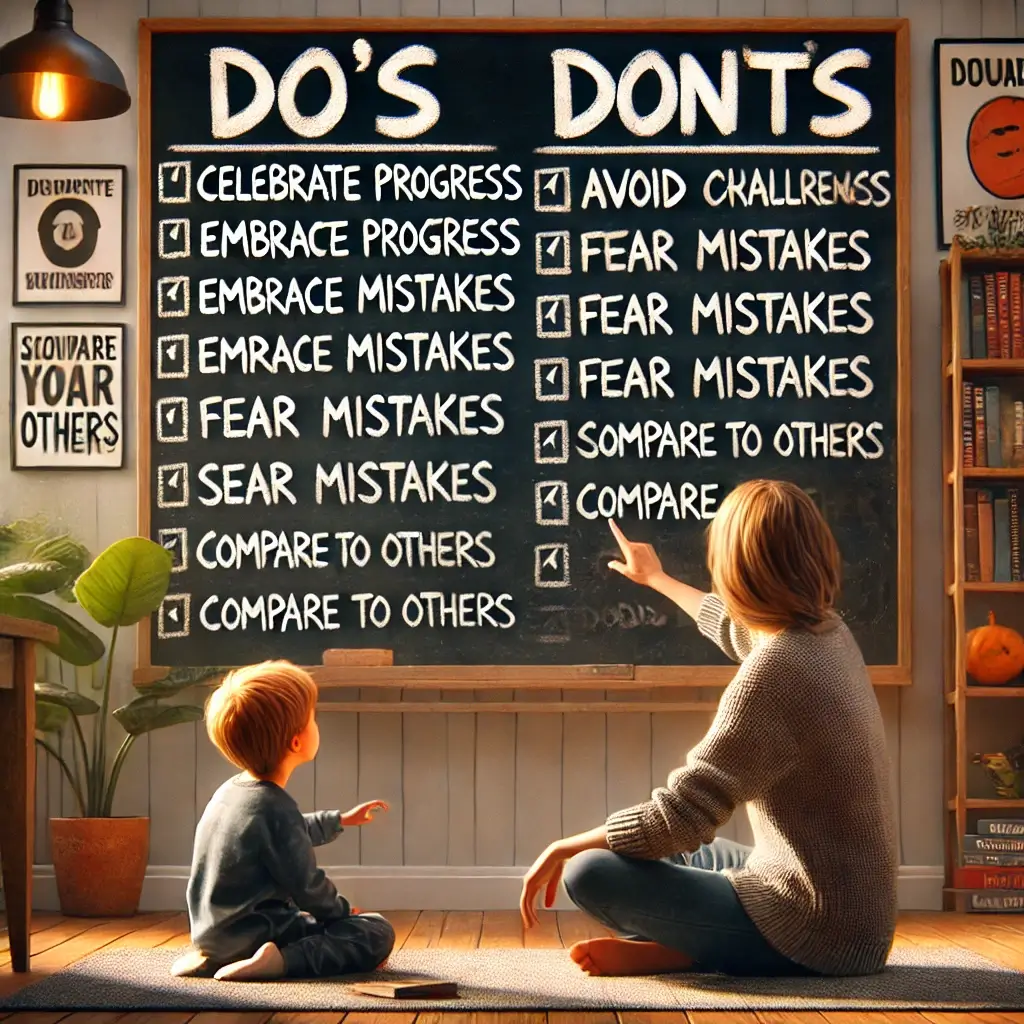If you—like almost everyone at times—feel stuck, overwhelmed, or caught in a whirlwind of thoughts, know that things can change. If you see this in your children, there’s hope for them too. Today, we’re diving into the fascinating topic of how a change in mindset can reshape your life and the way you (or your kids) see the world.
We’ll explore the groundbreaking work of Dr. Carol Dweck at Stanford University and share science-backed practices that anyone can use to make meaningful changes in their mindset—and their life.

Do you believe your talents and intelligence are fixed? What if real growth lies in transforming how you think about learning and improvement?
This is the power of the Growth Mindset—a revolutionary concept by Dr. Carol Dweck at Stanford University. It reveals that your potential isn’t set in stone but can expand with effort, strategy, and persistence—no matter your age.
For adults, adopting a Growth Mindset can transform careers, relationships, and personal growth. The best part? Cultivating this mindset doesn’t require drastic changes; small shifts in how you approach challenges can lead to profound and lasting results.
🌟 What is a Growth Mindset, and Why Does It Matter for Personal Growth?

A Growth Mindset is the belief that intelligence and abilities can improve with effort, learning, and persistence. 🚀
In contrast, a Fixed Mindset assumes talents are static, creating self-imposed limitations. Adults with a Growth Mindset embrace challenges, view setbacks as opportunities, and believe they can grow through deliberate effort.
This mindset impacts every area of life:
- In Careers: You’re more likely to take on challenges and build new skills.
- In Relationships: You develop stronger, more empathetic connections by embracing feedback.
- In Personal Goals: You explore interests and tackle obstacles with confidence.
🌟 How the Growth Mindset Shapes Daily Life for Adults and Children

A Growth Mindset influences how we approach challenges, relationships, and opportunities daily. Whether you’re navigating a career, supporting a child’s education, or exploring personal growth, this mindset has transformative effects.
For Adults 🌱
-
Overcoming Challenges at Work
- Example: Imagine being asked to present in front of colleagues, a skill you’re not confident in. With a Growth Mindset, you practice, seek feedback, and improve with each attempt. Over time, you turn a challenge into a strength.
-
Building Stronger Relationships
- Example: During a conflict with a friend, you reflect on your actions and learn to communicate better. This mindset fosters resilience and helps strengthen bonds.
-
Pursuing Lifelong Learning
- Example: Always wanted to learn a skill like painting or coding? A Growth Mindset helps you reframe “I’m too old” to “It’s never too late to start.” Small, consistent steps lead to meaningful progress.
For Children 🌈

-
Confidence in Learning
- Example: A child struggling in math learns that a bad grade isn’t a failure—it’s a chance to practice new strategies and try again. Small improvements build their confidence over time.
-
Social Growth
- Example: When excluded from a game, a child with a Growth Mindset might think, “How can I connect with others next time?” This perspective encourages proactive social learning.
-
Mastering New Skills
- Example: A child learning to ride a bike may fall but persists with encouragement, eventually mastering the skill. This teaches them the value of effort and resilience.
🔄 The Common Thread: Effort and Adaptability

For both adults and children, the Growth Mindset focuses on effort over perfection:
- Celebrate Effort: Value the process, not just the outcome.
- Learn from Mistakes: Reflect and adjust for better results.
- Stay Curious: Embrace challenges as opportunities to grow.
When adults model this mindset, they inspire children to approach life with optimism and resilience, creating a ripple effect of growth in their homes and communities.
🔬 The Science Behind the Growth Mindset

The Growth Mindset is backed by neuroscience, making it more than just a motivational idea.
-
Neuroplasticity 🧠
- Your brain can form new connections and adapt throughout life. This ability, called neuroplasticity, proves that consistent effort leads to growth at any age.
-
- Your brain predicts, learns, and adapts based on feedback. A Growth Mindset makes this natural process more effective, helping you grow from mistakes and embrace challenges.
-
Focus on Progress Over Perfection 🎯
- Growth happens when you value improvement, not flawlessness. This shift builds confidence and long-term success.
🎯 Simple Growth Mindset Strategies for Everyday Life

-
Focus on Effort and Strategy, Not Just Results 🌟
- How to Apply: Celebrate your approach to challenges: “I’m proud of how I handled this” or “I learned something new.”
-
Embrace Mistakes as Learning Opportunities 🔄
- How to Apply: When mistakes happen, ask: “What can I learn from this?” and “What will I try next time?”
-
Push Beyond Your Comfort Zone 🧗
- How to Apply: Take on small, challenging tasks, like learning a new skill or tackling a tough project at work.
-
Reframe Challenges with “Yet” 🎮
- How to Apply: Replace “I can’t do this” with “I can’t do this yet.” This reinforces growth as a process.
-
Reflect on Progress 🌈
- How to Apply: After any experience, ask: “What worked?” and “How can I improve next time?”
🌱 Why Gradual Progress is Key to Success

Sustainable growth happens step by step. The Zone of Proximal Development (ZPD) shows that taking on manageable challenges over time builds lasting confidence and adaptability.
- Small successes reinforce resilience and momentum.
- Every step, even imperfect ones, contributes to meaningful progress.
By celebrating small wins, you embrace the journey of self-improvement and foster lasting change.
🌍 Why the Growth Mindset Matters in Every Area of Life

Adopting a Growth Mindset unlocks potential across all aspects of life:
-
Career Success 💼
You’ll take on challenges, build skills, and embrace professional growth opportunities. -
Stronger Relationships ❤️
With empathy and open communication, you’ll foster deeper, more resilient connections. -
Exploration and Hobbies 🌟
You’ll take on new activities without fear of failure, discovering joy in learning and trying new things.
✅ Do’s and Don’ts for Developing a Growth Mindset

✅ Do: Celebrate small wins and effort over perfection.
❌ Don’t: Avoid challenges because they feel uncomfortable.
✅ Do: Reframe mistakes as opportunities to learn and improve.
❌ Don’t: Compare yourself to others—focus on your personal journey.
✅ Do: Embrace feedback as a tool for growth.
❌ Don’t: Label yourself with fixed traits like “bad at maths” or “not creative.”
🌟 Final Thoughts: Unlocking Your Potential with a Growth Mindset

The Growth Mindset isn’t just an idea—it’s a proven framework for growth, confidence, and resilience. By focusing on effort, learning from mistakes, and embracing challenges, you’ll unlock your full potential at any age.
Start today by celebrating your progress, reflecting on your experiences, and embracing the journey of lifelong growth. Every small step brings you closer to unlocking the best version of yourself. 🌱
Found this guide useful? Help others discover the Getting to Give Project by sharing it. Your support allows more people to access cutting-edge, science-backed resources at no cost. 🌟 Thank you for reading!
📚 Further Reading:
⦁ “Mindset: The New Psychology of Success” by Carol S. Dweck
This seminal work explores how adopting a growth mindset can lead to success in various aspects of life.
⦁ “Grit: The Power of Passion and Perseverance” by Angela Duckworth
Duckworth examines the role of perseverance and passion in achieving long-term goals, complementing the principles of a growth mindset.
Articles:
⦁ “Cultivating a Growth Mindset at Work: Tips and Examples”
This article provides practical strategies for fostering a growth mindset in professional settings.
Employ Digital Blog
⦁ “15 Ways to Build a Growth Mindset”
Offers actionable steps to develop a growth mindset in daily life.
Psychology Today
Research Papers:
⦁ “Implicit Theories of Intelligence Predict Achievement Across an Adolescent Transition: A Longitudinal Study and an Intervention”
This study by Carol Dweck and colleagues explores how beliefs about intelligence influence academic achievement.
“Why Aren’t Growth Mindsets Boosting Your Child’s Grades?”
An article discussing the complexities of implementing growth mindset interventions effectively.
Psychology Today




















